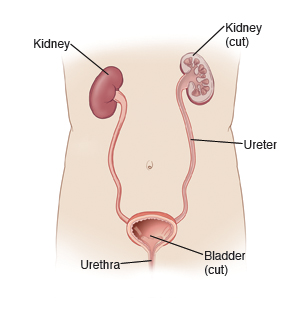Kidney Infection (Adult Female)

An infection in 1 or both kidneys is called pyelonephritis. It usually happens when bacteria get into the kidney. Rarely it is caused when other germs, such as viruses, fungi, or other disease-causing organisms get into the kidney. The bacteria or other disease-causing organisms can enter the kidneys from the bladder or blood traveling from other parts of the body. A kidney infection can become serious. It can cause severe illness, scarring of the kidneys, or kidney failure if not treated correctly.
Common causes for this problem include:
-
Not keeping the genital area clean and dry, which promotes the growth of bacteria
-
Wiping back to front. This drags bacteria from the rectum toward the urinary opening (urethra).
-
Wearing tight pants or underwear. This lets moisture build up in the genital area, which helps bacteria grow.
-
Holding pee (urine) in for long periods of time
-
Dehydration
-
Urinary tract infections
-
Blockages of pee draining from the kidney, such as a kidney stone
Kidney infections can cause symptoms similar to a bladder infection. Symptoms include:
-
Pain or burning feeling when peeing
-
Having to pee more often than normal
-
Blood in the pee (pink or red)
-
Belly (abdominal) pain or discomfort, usually in the lower belly
-
Pain in the side or back
-
Pain above the pubic bone
-
Fever or chills
-
Vomiting
-
Loss of appetite
Treatment is oral antibiotics. More severe cases are treated with IM (intramuscular) or IV (intravenous) antibiotics. These are started right away and may be changed once urine culture results show the infecting organisms. Treatment helps prevent a more serious kidney infection. Symptoms of kidney infections can vary based on your age.
Medicines
Medicines can help in the treatment of a bladder infection:
-
Take antibiotics exactly as prescribed and until they are used up, even if you feel better. It's important to finish them to make sure the infection is gone.
-
Unless another medicine was prescribed, you can use over-the-counter medicines for pain, fever, or discomfort. If you have chronic liver of kidney disease, talk with your healthcare provider before using these medicines. Also talk with your provider if you've ever had a stomach ulcer or digestive bleeding. Or if you are taking blood thinners.
Home care
Here are some general care guidelines:
-
Stay home from work or school. Rest in bed until your fever breaks and you are feeling better, or as advised by your healthcare provider.
-
Drink lots of fluid unless you must restrict fluids for other medical reasons. This will force the medicine into your urinary system and flush the bacteria out of your body. Ask your provider how much you should drink.
-
Don't have sex until you have finished all of your medicine and your symptoms are gone.
-
Don't have caffeine, alcohol, or spicy foods. These foods may irritate the kidneys and bladder.
-
Don't take bubble baths. Sensitivity to the chemicals in bubble baths can irritate the urethra.
-
Make sure you wipe from front to back after using the toilet.
-
Wear loose clothes and cotton underwear.
Prevention
These self-care steps can help prevent future infections:
-
Drink plenty of fluids to prevent dehydration and flush out the bladder. Do this unless you must restrict fluids for other health reasons, or your healthcare provider told you not to.
-
Make sure you wipe from front to back after using the toilet.
-
Pee more often. Don't try to hold pee in for a long time.
-
Don't wear tight-fitting pants and underwear.
-
Improve your diet to prevent constipation. Eat more fruits, vegetables, and fiber. Eat less junk and fatty foods. Constipation can make a urinary tract infection more likely. Talk with your healthcare provider if you have trouble with bowel movements.
-
Pee right after sex to flush out the bladder.
Follow-up care
Follow up with your healthcare provider, or as advised. Additional testing may be needed to make sure the infection has cleared. Close follow-up and further testing is very important to find the cause and to prevent future infections.
If a urine culture was done, you will be contacted if your treatment needs to be changed. If directed, you may call to find out the results.
If you had an X-ray, CT scan, or other diagnostic test, you will be told of any new findings that may affect your care.
Call 911
Call 911 if any of the following occur:
-
Trouble breathing
-
Fainting or loss of consciousness
-
Fast or very slow heart rate
-
Weakness, dizziness, or fainting
-
Trouble waking up or confusion
When to get medical care
Call your healthcare provider right away if any of these occur:
-
Fever 100.4°F (38°C) or higher, or as advised by your provider
-
Not feeling better or symptoms get worse 1 to 2 days after starting antibiotics
-
Any symptom that lasts after 3 days of treatment
-
More pain in the stomach, back, side, or groin area
-
Repeated vomiting
-
Not able to take prescribed medicine due to nausea or another reason
-
Bloody, dark-colored, or bad-smelling pee
-
Trouble peeing or peeing less than normal
-
No pee for 8 hours, no tears when crying, confusion, sunken eyes, or dry mouth